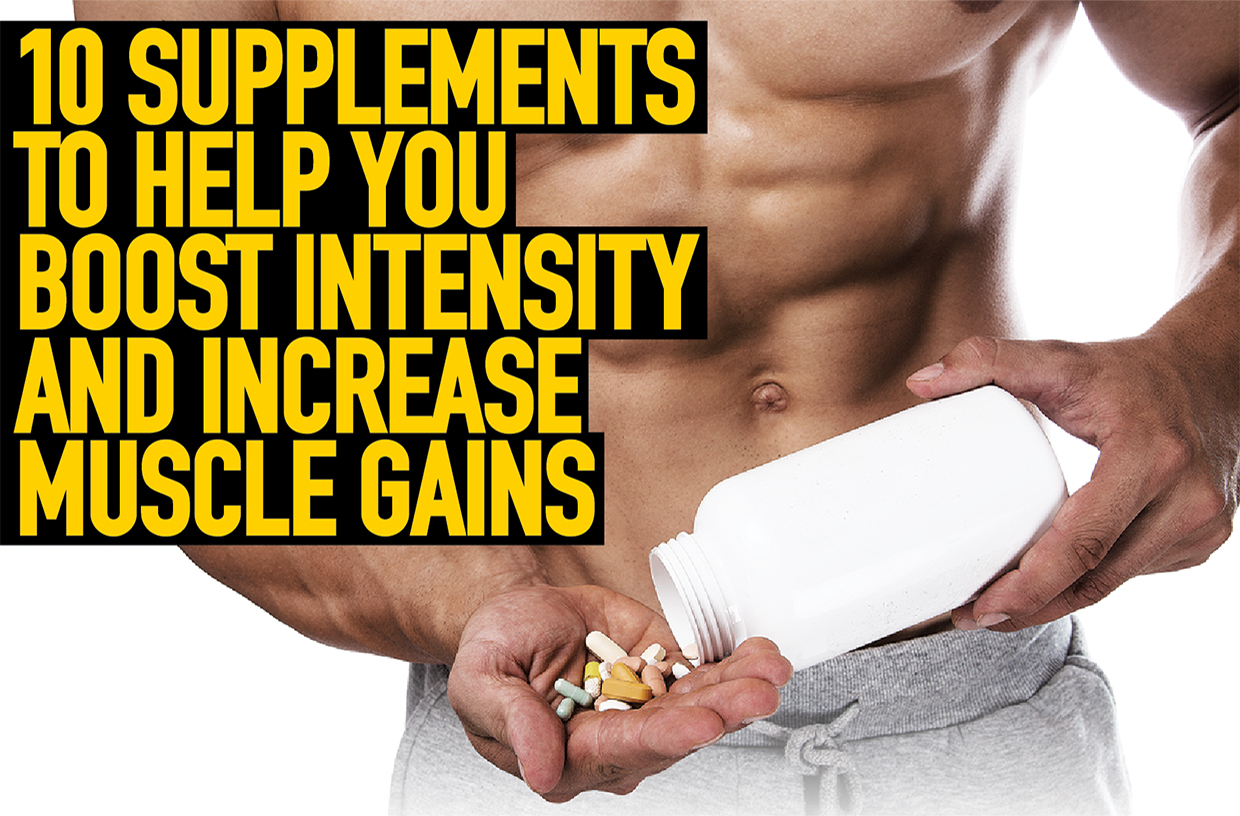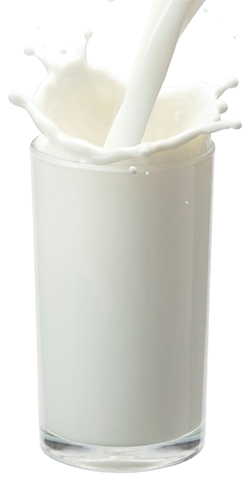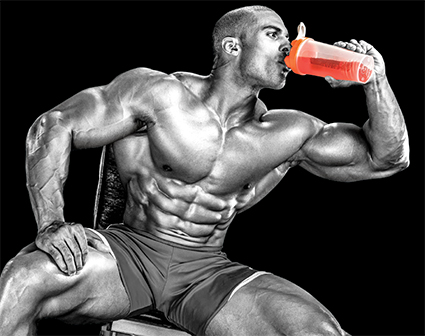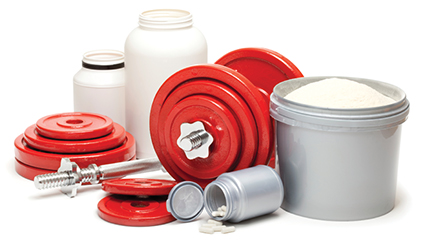10 Supplements to Help You Boost Intensity and Increase Muscle Gains

The science of supplementation and
muscle gains in the gym
Supplements are very helpful in aiding you to attain the physique of your dreams, but they can get expensive. If you have the finances, I suggest adding the following to your supplement regimen. None of these are critical, but they do help. They’re the icing on the proverbial cake. Real whole-food meals are where it’s at for winter mass building, but every little bit helps. The point here is, don’t buy pills instead of steak. But if you have the disposable income, then buy the pills after you have enough real food to turn you from Bill Bixby into a hulking Lou Ferrigno!
Creatine Monohydrate
This is the one supplement we all seem to agree on. It was revolutionary when it first appeared in the ’90s, and it still works. Although there are many versions out now, I suggest the original monohydrate. It’s very inexpensive, and it works. Don’t bother with the loading phase; just take 5 to 10 grams before and after working out. On non-workout days, I like to take a dose first thing in morning.

Glutamine
I’m a huge fan of it. I recover faster when I take it. It has fallen somewhat out of favour in recent years, but for me, it’s a must-have supplement. I take it pre- and post-workout and before bed. Take 5 to 10 grams at each serving.

 Multivitamins
Multivitamins
Not the flashiest supplement but a staple. Take them. They’re cheap and effective.
Beta-Alanine
Now I’m personally not a fan of it for one reason only: the itching/burning sensation you get when taking it. It does diminish as you get used to it, but I’m hypersensitive to it. It’s unfortunate I can’t tolerate it, as it’s a solid supplement. Take it before working out. Most pre-workout supplements include it. I recommend 3 to 6 grams per day. You can divide it up throughout the day, but be certain to take it as a pre-workout.
Caffeine
This is my personal pre-workout. Coffee works, but I prefer 200-milligram caffeine pills. Take 200 to 400 milligrams before your workout. I strongly suggest that if you have any health issues, especially heart issues, consult a doctor before using any stimulants.

Forskolin
This is another favourite of mine, and for some reason, it doesn’t get as much press as others. It can increase fat loss, increase testosterone, increase protein absorption, and give energy for your workout. It really has so many benefits that it should be more popular. However, it’s a herbal supplement, and the quality can vary by brand and by the percentage of active ingredient. Most supplements contain 10 percent forskolin per serving, but it can vary from much lower to over 20 percent. The dose that has worked in studies was 250 milligrams twice per day of a 10 percent forskolin supplement. It definitely works as both a fat-loss and hardening agent, in my own experience. I am always somewhat leery of claims about testosterone boosting, but it does so much I believe it’s worth adding to your stack. Just be certain you know the percentage you are getting per dose.

Ephedrine HCl
I was hesitant to include this as ephedrine gets such a bad rap. There is a lot of false information out there regarding ephedrine. If used by healthy people and in normal doses of 16 to 24 milligrams two to three times a day, it’s an amazing fat burner and energy booster, especially when combined with 200 milligrams of caffeine. The scope of this article makes an in-depth analysis of the supplement impossible. Suffice it to say many of the horror stories involving it are grossly exaggerated or the individual that experienced negative effects were taking ephedrine with other stimulants and often illegal drugs. The combination caused the issue, not ephedrine itself. It’s worth researching at the very least. It’s definitely helpful before an intense session. It’s best cycled as your body does adapt to it over time.

 Milk
Milk
Wait a minute … milk? Is milk a supplement? Well in the old days it was. In the 1940s, milk was their “steroid.” Milk and squats have put more muscle on more bodies than any other combination. Look up the book Super Squats for information on squats and milk. Milk is a staple. Milk and egg protein was the go-to protein until whey hit the market. Adding a few glasses of milk to each meal greatly increases calories and protein. It’s cheap, and it’s easy. Use milk in your shakes; it’s great post-workout as well. You can’t go wrong. As the old ads said, it does a body good.

Protein Shakes and Amino Acid Supplements
Protein shakes. They’ve been around nearly forever. They’re convenient, easy, and effective, but they don’t replace whole-food meals. However, post workout, I prefer a shake as it gets a jump-start on the repair and growth processes. Get in a mix of fast-acting and slow-releasing proteins with some quality carbs to help shuttle those aminos into the muscle. A mix of fast-acting whey protein and slower acting casein protein seems to be the best combo for post-workout needs. Drinking a whey/casein protein shake immediately after training activates muscle protein synthesis via the mTOR pathway, which assists in muscle recovery and growth. The sooner you get amino into your system, the faster the recovery process can begin. If you really want to take advantage of the post-workout window, I suggest taking in an essential amino acid supplement immediately post-workout, waiting 30 minutes, and then having your protein shake. Amino acids are more expensive, and if you’re on a budget, you can skip them and just go the shake route. But if you have the funds, it’s money well spent. EAA supplements include the branched-chain amino acids (BCAAs) and cover the full spectrum you need post workout to halt catabolism and start the rebuilding phase. With the amino supplements, you get a quick blast of aminos that are predigested; this lets them go to work immediately. Thirty minutes later, have your whey and casein shake, then one hour later, have a whole-food meal. The idea of the post-workout anabolic window has come under attack in recent years. However, there’s still a lot of truth to it, although it may last longer than we originally thought. Back in the ’90s, we were told it was around 30 minutes, but now it seems like it may last hours, even up to 24 hours. The point remains that this is the crucial time to take in nutrients to build muscle. So, don’t waste the opportunity. Immediately take in nutrients, be it amino acids and then a shake or just a shake.

Something I highly recommend is having a protein shake in the middle of the night. When you sleep, you’re fasting for eight hours straight, and that’s a long time to go without any food. Some pros get up and eat a full meal, but I believe that interrupts the sleep too much. However, having a protein shake made up before bed is a quick and easy way to supply the body with quality aminos when it’s growing and repairing itself. When you wake up at night, just grab your pre-made shake and down it. Simple and effective.
Many companies make excellent protein shakes. However, if you like, you can make your own quite easily as well. There are countless ingredients you can add to make a fast nutritious and delicious shake. Try adding milk, whole eggs, liquid egg whites, skim milk powder, and cream or half and half for extra calories, and fats, honey, fruit, yogurt, and crushed ice for texture.
Photos: Dave Laus, Gregory James, Chris Wynia and Getty Images.
Click HERE to sign up for our free newsletter!



